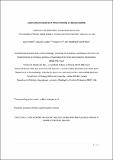Causes and consequences of female centrality in cetacean societies
Abstract
Cetaceans are fully aquatic predatory mammals that have successfully colonized virtually all marine habitats. Their adaptation to these habitats, so radically different from those of their terrestrial ancestors, can give us comparative insights into the evolution of female roles and kinship in mammalian societies. We provide a review of the diversity of such roles across the Cetacea, which are unified by some key and apparently invariable life-history features. Mothers are uniparous, while paternal care is completely absent as far as we currently know. Maternal input is extensive, lasting months to many years. Hence, female reproductive rates are low, every cetacean calf is a significant investment, and offspring care is central to female fitness. Here strategies diverge, especially between toothed and baleen whales, in terms of mother–calf association and related social structures, which range from ephemeral grouping patterns to stable, multi-level, societies in which social groups are strongly organized around female kinship. Some species exhibit social and/or spatial philopatry in both sexes, a rare phenomenon in vertebrates. Communal care can be vital, especially among deep-diving species, and can be supported by female kinship. Female-based sociality, in its diverse forms, is therefore a prevailing feature of cetacean societies. Beyond the key role in offspring survival, it provides the substrate for significant vertical and horizontal cultural transmission, as well as the only definitive non-human examples of menopause. This article is part of the theme issue ‘The evolution of female-biased kinship in humans and other mammals’.
Citation
Rendell , L E , Cantor , M , Gero , S , Whitehead , H & Mann , J 2019 , ' Causes and consequences of female centrality in cetacean societies ' , Philosophical Transactions of the Royal Society. B, Biological Sciences , vol. 374 , no. 1780 , 20180066 . https://doi.org/10.1098/rstb.2018.0066
Publication
Philosophical Transactions of the Royal Society. B, Biological Sciences
Status
Peer reviewed
ISSN
0962-8436Type
Journal item
Collections
Items in the St Andrews Research Repository are protected by copyright, with all rights reserved, unless otherwise indicated.

